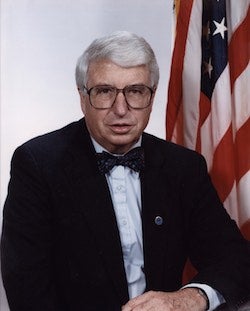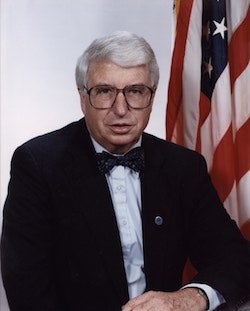 NARRAGANSETT, R.I. — November 25, 20015 — The University of Rhode Island was notified that Dr. John A. Knauss, a visionary marine scientist, educator, and acclaimed national environmental leader died peacefully at his home in Saunderstown, R.I., on Nov. 19. He was 90 years old at the time of his death.
NARRAGANSETT, R.I. — November 25, 20015 — The University of Rhode Island was notified that Dr. John A. Knauss, a visionary marine scientist, educator, and acclaimed national environmental leader died peacefully at his home in Saunderstown, R.I., on Nov. 19. He was 90 years old at the time of his death.
Throughout his long and productive career, Knauss was a true statesman for the oceans and marine sciences. He was the former Under Secretary for Oceans and Atmosphere in the Department of Commerce and administrator of the National Oceanic and Atmospheric Administration. Dr. Knauss was also the founding dean of the University of Rhode Island’s Graduate School of Oceanography.
Upon hearing of his passing, Sen. Sheldon Whitehouse (D-RI), and University of Rhode Island President David M. Dooley commented on the pivotal role he played shining a light on the importance and fragility of the oceans.
“Rhode Island has lost a beloved teacher, a visionary leader, and a brilliant scientist,” said Sen. Whitehouse. “Dean Knauss set out to create in the Ocean State a comprehensive oceanography and marine studies program. When he left the University of Rhode Island to head up the National Oceanic and Atmospheric Administration a quarter-century later, his Graduate School of Oceanography had become one of the premier graduate education and research institutions in oceanography in the world, and Knauss Fellowships became among the most prestigious of marine policy grants. Beyond his foresight and leadership, John will be remembered for his collegiality and collaboration among the administrators, faculty, and students he touched, and for his passion for living. Sandra and I extend our heartfelt condolences to the Knauss Family and to the entire marine science community.”
President Dooley said: “Dr. John Knauss was a tremendous, forward-thinking leader who broadened the world’s understanding of the complexity and importance of the oceans. His vision inspired and created the national oceanographic programs, legislation and policies that still guide us today. The University of Rhode Island’s renowned Graduate School of Oceanography is just one of his many legacies for which our students, alumni and the entire University are very thankful.”
In lieu of flowers, the family requests that donations be made in his memory to the John A. Knauss Fund for Oceanographic Excellence, or to the charity of your choice. Contributions can be made payable to the “URI Foundation” with “John A. Knauss Fund for Oceanographic Excellence” in the subject line, and mailed to: URI Foundation, PO Box 1700, Kingston, RI 02881.
A memorial gathering will be held Saturday, December 5th at the Village Inn (One Beach Street, Narragansett, RI) and will be from 3 – 6 PM with remarks at 4 PM. A second memorial gathering will occur sometime in late spring or early summer and will be announced at a later date.
Biography: John A. Knauss
John A. Knauss was born in Detroit, Michigan on September 1, 1925 to Karl and Loise Knauss, both of whom were teachers. He attended the Massachusetts Institute of Technology where he studied meteorology as part of the United States Navy’s V-12 program, met his future wife Lynn, received his B.S. in meteorology in 1946 and was commissioned as an Ensign in the United States Navy and was assigned to Weather Central on North Island in San Diego, Calif. Soon after leaving the service, Knauss went to the University of Michigan and received a Master of Science degree in Physics in 1949.
Knauss then worked with the Office of Naval Research at the Navy Hydrographic Office in Suitland, MD, where he lobbied and gained support for the Navy to work with universities for oceanographic research. He soon realized that he wanted to pursue a career in oceanography and enrolled at the Scripps Institution of Oceanography. In his dissertation research, Knauss made the first comprehensive measurements of the Pacific Equatorial Undercurrent and demonstrated this to be a major component of the Pacific Ocean circulation and later discovered a similar current in the Indian Ocean. He received his Ph.D. in 1959.
In 1961, Knauss was recruited to the University to build a new oceanographic institution, the Graduate School of Oceanography, at URI’s Narragansett Bay Campus. Knauss recognized this as a unique opportunity having a major research facility on Narragansett Bay, with students being able to take non-oceanography courses on the main campus only six miles away. After buying a mothballed 180-foot, one-thousand-ton World War II Army vessel for $500 through the federal government’s educational surplus program, Scripps helped Knauss transfer the vessel via the Panama Canal to Rhode Island. The R/V Trident was then put into action for oceanographic research in the Atlantic Ocean, the Mediterranean and Caribbean Seas, Gulf of Mexico, and the eastern tropical Pacific Ocean during the next 15 years. In 1977, Knauss helped to acquire the R/V Endeavor, which is owned by the National Science Foundation and continues to be operated throughout the Atlantic Ocean by the Graduate School of Oceanography.
When he retired after 25 years as dean, Knauss left the University of Rhode Island with a major oceanographic institution, boasting 41 faculty, 73 professional staff, 169 graduate students, 12 buildings and the R/V Endeavor. However, Knauss had a significant and long-lasting impact at the University itself serving as Provost for Marine Affairs (1969-1982), Acting Vice President for Academic Affairs (1976), and Vice President of Marine Programs (1982-1987). Working closely with others at the University, the Department of Geography and Marine Affairs were established creating the nation’s first marine affairs degree program and the first Ph.D. program in marine affairs. He fostered the vision that marine programs were important university-wide and helped develop the first Ocean Engineering department, a Resource Economics department with strong marine focus, and the evolution of the Animal Sciences department to Fisheries, Animal, and Veterinary Sciences. He retired from the University in 1990 and was named Dean and Professor Emeritus at the Graduate School of Oceanography.
In addition to the many achievements made at the university during his tenure, Knauss also helped to shape the National Oceanic and Atmospheric Administration’s Sea Grant program, a new program similar to land grant colleges. A national conference to discuss such a concept was held in 1965, and the National Sea Grant College Program and Act went into effect in 1966. In recognition of Knauss’ leadership in the development of Sea Grant, the flagship program of Washington, DC internships was named for him in 1979, the Dean John A. Knauss Marine Policy Fellowship.
After stepping down as dean, Knauss was then recruited by the George Bush Sr. administration to become Undersecretary for Oceans and Atmosphere and Administrator, National Oceanographic and Atmospheric Administration (NOAA), U. S. Department of Commerce (1989 – 1993). Knauss served on many national and international organizations and committees during the course of his career including as president of the American Geophysical Union and its Oceanography Section, the Association of Sea Grant Program Institutions, vice preside nt of the American Association for the Advancement of Science and chair of the Section on Atmospheric and Hydrospheric Sciences, Board of Directors of the National Oceanography Association and he was president of and chair of the University- National Oceanographic Laboratory System (UNOLS).
Knauss was involved with a number of important national initiatives during his career. He was a member of the influential Stratton Commission and the only academic oceanographer on the commission that produced the report, Our Nation and the Sea: A Plan for National Action, in 1969. The report provided a plan for the use of the oceans and the governmental structures needed to achieve the objectives of the plan and led to the creation of the National Oceanic and Atmospheric Administration (NOAA) and the formation of the Coastal Zone Management Act. He was very interested in freedom of research on the high seas and was a delegate to the Law of the Sea meeting, where he was critical in the discussions to insure access for research on continental margins beyond the 200-mile limit. Over the years, he wrote many important papers on law of the sea.
Knauss was also known for his keen sense of humor. He was a member of the American Miscellaneous Society formed “to see the lighter side of heavier problems” and together with Art Maxwell and Gordon Lill created the Albatross Award which they immediately awarded to themselves for creating the award. He later wrote “since it was their idea in the first place, they gave the first one to themselves, knowing they might not otherwise be nominated.”
Knauss received numerous awards and honors in recognition of his contributions to oceanography and marine affairs including the National Sea Grant Award, Rhode Island Science and Technology Award, Ocean Sciences Award from the Ocean Sciences Section of the American Geophysical Union, American Geophysical Union Athelstan Spilhaus Prize and the Ram Award of the URI Alumni Association. He was a Fellow of the American Association for the Advancement of Science, American Geophysical Union, and the Marine Technology Society. He was inducted into the Rhode Island Heritage Hall of Fame in 1983 and was awarded an honorary Doctor of Science from the University of Rhode Island in 1992.
A Scripps graduate, when Knauss was appointed dean of the Graduate School of Oceanography, the deans of the three other oceanography schools (University of Washington, Oregon State University and Texas A & M) were also Scripps graduates. However, at the time of his death, the Dean and Director of the Scripps Institution of Oceanography, the Vice President and Dean of the Graduate Program at Woods Hole Oceanographic Institution and the Dean of the Graduate School of Oceanography are all alumni of the Graduate School of Oceanography and were graduate students with Knauss as their dean. His leadership and dedication to oceanography made a lasting impression on these and many other alumni that had the good fortune to be students during his tenure.

